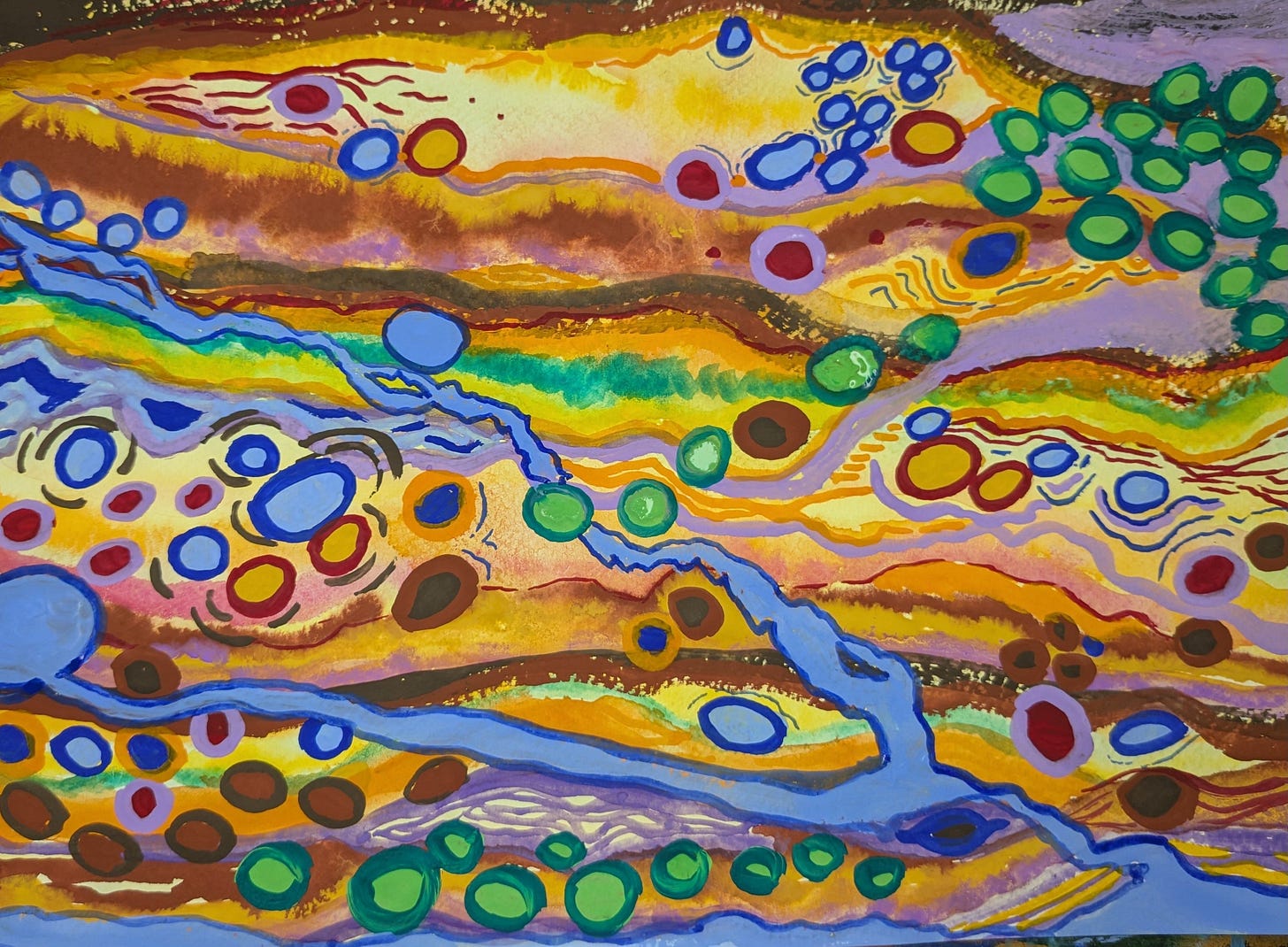The Auti Peri Q&A: Audhdpainter
"It felt like life was even more difficult, almost impossible to function."
Hi, I’m Sam (she/her). A late diagnosed neurodivergent woman, a tenacious midlife struggler, and an advocate for people in autistic perimenopause here at The Autistic Perimenopause: A Temporary Regression AKA The Auti Peri.
I am delighted to be the host of The Auti Peri Q&A Series!
In this series, I host a Q&A interview with a fellow autistic person about their experience of the menopause transition.
Everyone’s experience of the autistic menopausal transition is different. I aim to elevate the voices, lived experiences and reflections of autistic people’s menopausal transition.
Autistic perimenopause is a highly individual, dynamic and sometimes prolonged life stage caused by reproductive hormonal fluctuations. As autistics can be highly sensitive to bodily and environemntal, we may experience fluctuations as physical, psychological and cognitive symptoms.
Academic research into auti peri is in it’s early stages, yet it is a matter or urgency that we bust the social taboo and get used to talking about this.
Today’s guest goes by the name of her Substack, Audhdpainter: “Keeping sane and finding joy through art and nature while navigating a neurotypical world, chronic illness and menopause.”
Audhdpainter (she/her) lives in Hampshire, UK.
Audhdpainter’s stunning art is available for viewing and purchase on the LaHickmana page at Red Bubble: “A self-taught artist. I love playing with colour and texture to produce nature themed original art.”
What does “autistic perimenopause” mean to you?
Going by what friends have said perimenopause seems to be a complete nightmare for a lot of people whether autistic or not.
For me I think the AuDHD made the sensory parts harder especially the crawling skin, and also the mood swings and turbulent emotions were extremely difficult to deal with. It also magnified the ADHD side of my AuDHD, and I had some really awful periods of inertia.
It felt like life was even more difficult, almost impossible to function.
When did your autistic perimenopause symptoms start and what were/are they?
Mid 40s, rage, migraines, inertia, wacky periods, crawling skin, low mood, less ability to cope with everything, a questioning of life and what I want.
What happened if/when you presented with autistic perimenopause to a healthcare professional?
I didn't present the autistic side, but I did ask for help GP started me on HRT which I reacted incredibly badly too (almost suicidal).
I eventually got to a menopause clinic (my GP referred me to gynae twice because they didn't know where the menopause clinic was). Menopause clinic couldn't offer anything if I couldn't take HRT.
So upped antidepressants and pain meds. That was it.
What has your treatment protocol been in managing your autistic perimenopause?
I also tried meditation and yoga which did help. Though illness flare up has stopped them again, but I'm through to menopause and it's not as awful, things are settling hormone wise, definitely calmer.
Still getting hot flushes and some migraines and my flare up is still bad. I'm pretty sure this is peri/menopause related!
How has your everyday life been impacted by autistic perimenopause (your caring/employment responsibilities, hobbies, relationships etc.)?
Everything was impacted by perimenopause, I felt like a different person, angry, sad, fed up with everything, that is not me at all!
Even with chronic illness I've never been as totally angry at the world.
Thankfully my family hung in there with me and helped me through it.
I'm really hoping that the starting of my hormones settling will also mean that this awful flare up of ME will settle and let me do a bit more because I'm mostly housebound at the moment.
Are there things that make or have made your menopause transition especially difficult for you as an autistic person? If so, what kinds of things?
The inexplicable emotions and sensory things like crawling skin, itchy ears, migraines, eczema (not had since a child) the exacerbated ADHD, brain fog, memory issues, just the massive number of symptoms all thrown in at once!!
Are there things that could make or could have made your menopause transition easier for you as an autistic person? If so, what kinds of things?
A more understanding GP, a menopause clinic that could actually offer something (anything) to help if you can't use HRT.
What supports, resources and services are available to people experiencing autistic perimenopause where you live?
Nothing
What kinds of services, resources or supports would you find most helpful?
A creative rage group for perimenopausal women?
What is the easiest way for you to access information about autistic menopause?
Through your writing! Talking with others I know, Googling.
What would you wish for all people to know about autistic perimenopause?
That there is calm and hope on the other side.
Is there anything else you’d like to share regarding your autistic experiences of menopause?
It'd be nice to know ahead of time that each symptom is temporary and that you will come out the other side.
Also to know that perhaps it's not the best time to make big life decisions as it can feel like you need to change your entire life, leaving your old life behind, and although that could be true for some, for many it will feel very different when the rage passes!!
I hope you have enjoyed this Q&A. If you would like to be featured as part of this series, please message me. I’d love to share your story!







Thank you for including me in this excellent idea @Sam Galloway (she/her) 💕 xx
“So… That was it.”
I actually appreciate the blunt point. So many interviews seem to be framed as if there’s these illusive solutions you are for sure going to find or get to, if… only… you… just… keep… seeking… and trying (insert whatever interview wants focus on).
30 years in and part of the lesson was that sometimes, in some scenarios, no matter how hard you hunt, or how deep you go, how much you spend, or how many hours, if not years or decades, you put in trying to learn about what you can do to navigate… sometimes you just don’t get the answers you hope might exist.
The comment on that part of the interview just really struck me. I appreciate interviews that keep it real. We need more of that in the world today.